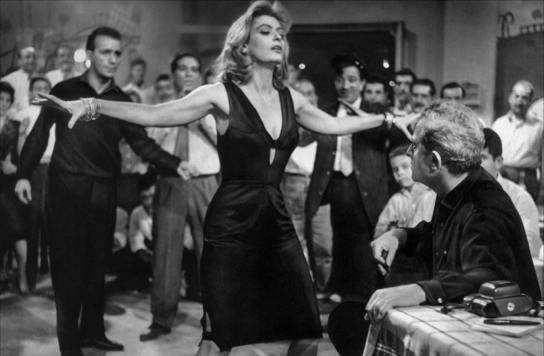- ΣΧΕΤΙΚΑ
- ΤΕΛΕΥΤΑΙΑ ΝΕΑ
- ΗΜΕΡΟΛΟΓΙΟ
- ΕΚΠΑΙΔΕΥΣΗ
- ΕΚΚΛΗΣΙΕΣ
- ΓΙΝΕ ΜΕΛΟΣ
- Ελληνικό Κέντρο
Eventlist
Εκδήλωση

- Τίτλος:
- Open Seminar: For the Love of Greece: Melina Mercouri and Jules Dassin's Adoration of Greek Culture
- Πότε:
- 01.10.2015 19.00 h
- Που:
- Greek Centre Melbourne (Mezzanine) - Melbourne
- Κατηγορία:
- Εκπαίδευση
Περιγραφή
Presenter: Dr Leanne Glass.
Entry:FREE
Synopsis
Film's ability to stir the emotions of its audience makes this highly popular form of entertainment a significant platform to convey the filmmaker's own agenda. Sometimes this personal view is overtly apparent or it can be obfuscated by the pure enjoyment experienced by the viewer. This use of film as a tool to make personal comment is evident in Jules Dassin's Never on Sunday and A Dream of Passion.
For example, in their first joint collaboration, Never on Sunday, Dassin's close, romantic relationship with Melina Mercouri, is playfully expressed in the friendship between the film's two main characters: Homer, who is an American, amateur historian and philosopher performed by Dassin, and the Greek prostitute, Illya, who is played by Mercouri. On the surface their banter is typical of a 1960s romantic comedy, combining an exotic, Mediterranean location and carefree lifestyle, Greek tradition and culture, music and plot that eventually sees the two protagonists respectfully part as friends.
Yet underlying this light-hearted story are the personal views of Dassin and Mercouri that influence the manner in which the characters and story are created. For Dassin, his former experiences with the House Un-American Activities Committee and subsequent blacklisting in 1952, which forced him into self-imposed exile overseas, made him critical of America's attitude and ideologies that he considered to be naïve and narrow-minded. While Mercouri's patriotic sensibilities and passionate recognition of her ancient Greek heritage are inherent character traits that give her a unique edge as a Greek citizen, actor and politician. These two themes are expressed in the character portrayals of Homer and Maya. Thus, Homer is a naïve American who believes that Illya's prostitution is symbolic of Greece's fall from its ancient greatness, and attempts to save her (Greece) by educating her in Western modes of thought. Yet Homer's teachings, which ironically are based on ancient Greek arts and sciences, makes Illya lose her Greek spirit – an identity that openly embraced her cultural makeup, carefree outlook and gregarious personality; a personification that in all its manifestations is Greece.
Dassin's unacknowledged sequel, A Dream of Passion, reconsiders these two themes but from a more dramatic perspective. This more serious tone can be partly attributed to America's involvement in the Vietnam War (c.1955-1975) and the effects of the Colonels regime (1969-1974) in Greece. In their last film together, Dassin's (and Mercouri's) critical views on American naiveté and Greek identity are manifested in the two female protagonists: Brenda Collins, performed by Ellen Burstyn, is an American housewife who has been imprisoned in Greece for killing her three children and whose story can be likened to a modern-day Medea. While Maya, played by Mercouri, is a Greek actor who has returned to her homeland from the United States to perform the role of Medea in a theatrical production of Euripides' tragedy. To completely immerse herself into her role Maya visits Brenda in prison. Each interaction between the two women reveals the extreme depths Western (American) influences have had on their personal and nation-based identities. For Brenda, her close adherence to American Cold War ideologies has rendered her illiterate and incapable of making independent decisions. She is literally without home and country. While Maya's extended stay in the United States, which seems to have instilled in her a strong desire for female independence or gender equality, has also 'blinded' her to her inherent connections with Greece. Gradually Maya sheds the Western influences that have made her 'Other' into an independent woman who fully embraces her ancient Greek heritage.
This brief synopsis of Never on Sunday and A Dream of Passion's personal connections with Dassin and Mercouri reveal their consistent aim to make manifest their desire for the recognition of Greece's ancient cultural legacy. That Dassin elevates Greece's standing to the detriment of his own nation shows his level of commitment to his adopted homeland. This is not to say he relinquished his American citizenship; rather, he embraced, adored and respected Greece as if the country was his own. While Mercouri's overt acknowledgement of her Greek heritage and outspoken views on preserving Greece's history and culture is recognized in her roles as Illya and Maya. That Never on Sunday was their first film together and A Dream of Passion was their last emphasizes the personal importance these two films held for Dassin and Mercouri. It is a about time we acknowledged this.
Bio
Leanne’s interest in ancient civilizations first began in her childhood when she would watch old black and white movies on a Sunday afternoon, which were often based on Classical myth and history.
Her natural inclination towards this historical period also saw her delve into any book that featured ancient cultures including Mesopotamia, Egypt, Greece and Rome. Fast-forward to the present day and her passion remains unabated, recently achieving her PhD in Classics at the University of Newcastle. Her thesis, National Identity, the Auteur and the Greek World on Film, considers the manner in which films based in ancient Greece can have an underlying narrative that reflects the filmmaker’s personal views on socio-cultural and political concerns.
This Reception-based study has attracted significant academic interest, which has seen Leanne invited to present at several conferences including Oxford University in June 2014 and at the Southwest Popular/American Cultural Association Conference in February 2015. Born in Melbourne and currently living in Dubai Leanne continues her research in cinematic representations of the ancient world.
Donors
During the course of the year considerable expenses are incurred in staging the seminars. In order to mitigate these costs individuals or organisations are invited to donate against a lecture of their choice, please email: Αυτή η διεύθυνση ηλεκτρονικού ταχυδρομείου προστατεύεται από κακόβουλη χρήση. Χρειάζεται να ενεργοποιήσετε την Javascript για να τη δείτε.
For this seminar we'd like to thank the following donors: Dr Marinis & Mrs Maria Pirpiris, Jim Bossinakis and P. & M. Mitrakas of Mitrakas Savas & Co Solicitors
You too can donate against one or more seminars and (optionally) let your name or brand be known as a patron of culture to our members, visitors and followers, as well as the broader artistic and cultural community of Melbourne.
We also thank the seminars' corporate sponsors:

Τόπος διεξαγωγής
- Venue:
- Greek Centre Melbourne (Mezzanine) - Διαδικτυακός τόπος
- Οδός:
- 168 Lonsdale Street
- ΤΚ:
- 3000
- Πόλη:
- Melbourne
- Νομός:
- VIC
- Χώρα:
-

The Mezzanine floor (press "M" in the elevator) of Greek Centre Melbourne - located at the corner of Lonsdale and Russell streets in Melbourne, Australia.
EventList powered by schlu.net











